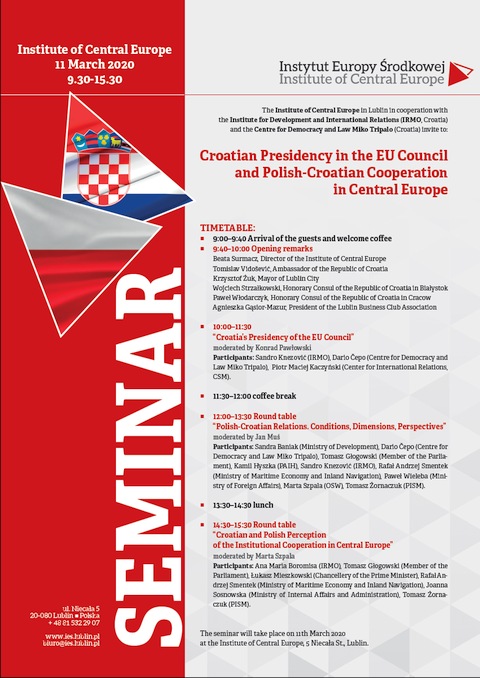The organizer is the Institute of Central Europe in Lublin together with its partner institutions from Croatia – the Institute for Development and International Relations (IRMO) and the Centre for Democracy and Law Miko Tripalo.
Polish-Croatian relations have been continuously developing since Croatia’s independence in 1991. The accession of Croatia to the European Union gave new dynamics to these relations. Currently, both countries have a lot in common and very little that could divide them. In addition to the membership in the European Union, both countries belong to NATO, as such defining their position in a multipolar world. Just like Poland, Croatia is a beneficiary of the European integration process. In international relations, these place Poland and Croatia in the same camp. But does this mean that both countries are allies on the international chessboard? Or are they rivals for limited material resources and security?
Croatia’s assumption of the Presidency of the Council of the European Union poses many challenges for this country but also opens up several possibilities. Not limiting its goals to deeper integration with the Euro and Schengen zones, the Republic of Croatia facilitates the process of enlargement of the European Union, especially in the face of the expected changes regarding the formula of this policy. Brexit and budget negotiations also fall under the Croatian presidency. To what extent does the Croatian presidency coincide with the expectations from Poland? Does the presidency exacerbate political differences between Poland and Croatia or level them?
The last topic we want to raise at our seminar is the answer to the question of how Poland and Croatia perceive institutional cooperation in Central Europe towards the other actors within and outside of the European Union. Are the eastern and southern vectors only an alternative for each other or are they strengthening each other?
The seminar will consist of three panels: 1. “Croatia’s presidency of the EU Council”, moderated by Konrad Pawłowski (IEŚ), 2. “Polish-Croatian relations. Conditions, dimensions, perspectives”, moderated by Jan Muś (IEŚ) and 3. “Croatian and Polish perception of institutional cooperation in Central Europe”, moderated by Marta Szpala (OSW).
The seminar will be attended by a number of Polish and Croatian experts and analysts. Additionally, guests have been invited representing diplomatic corp, local and regional authorities in Lublin and the NGO sector.
9:00–9:40 Arrival of the guests and welcome coffee
9:40–10:00 Welcome speech
Beata Surmacz, director of the IES,
Tomislav Vidošević, Ambassador of the Republic of Croatia
Wojciech Strzałkowski, Honorary Consul of the Republic of Croatia in Białystok
Paweł Włodarczyk, Honorary Consul of the Republic of Croatia in Cracow
Agnieszka Gąsior-Mazur, President of the Lublin Business Club Association
10:00–11:30 Panel I “Croatia’s presidency of the EU Council”, moderated by Konrad Pawłowski
Participants: Sandro Knezović (IRMO), Dario Čepo (Centre for Democracy and Law), Piotr Maciej Kaczyński, (Center for International Relations, CSM).
11:30–12:00 coffee break
The following panels II and III will have a form of round table. Experts will discuss the issues in question and express their own opinion on the matters.
12:00–13:30 Panel II “Polish-Croatian relations. Conditions, dimensions, perspectives”, moderated by Jan Muś
Participants: Sandra Baniak, Ministry of Development, Croatia, Dario Čepo, (Center for Democracy and Law), Tomasz Głogowski, Member of the Parliament in Poland, Kamil Hyszka, (PAIH), Sandro Knezović (IRMO), Rafał Andrzej Smentek, Ministry of Maritime Economy and Inland Navigation, Paweł Wieleba, MFA.
13:30–14:30 lunch
14:30–15:30 Panel III “Croatian and Polish perception of institutional cooperation in Central Europe”, moderated by Marta Szpala
Participants: Ana Maria Boromiša, (IRMO), Tomasz Głogowski, Member of the Parliament, Łukasz Mieszkowski, Chancellery of the Prime Minister, Rafał Andrzej Smentek, Ministry of Maritime Economy and Inland Navigation, Joanna Sosnowska, Ministry of Internal Affairs and Administration.

The seminar: Croatian Presidency in the EU Council and Polish-Croatian cooperation in Central Europe – 11.03.2020